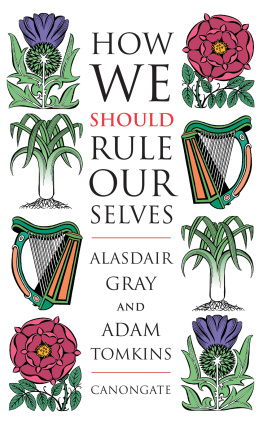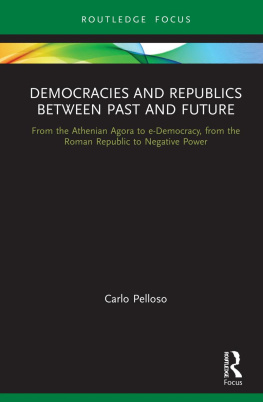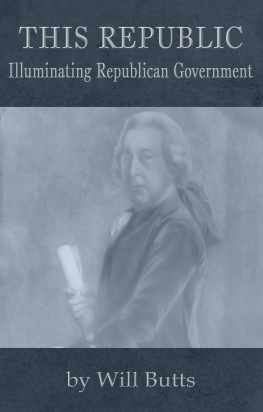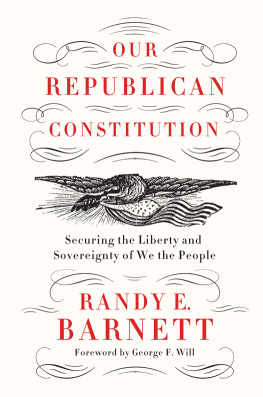Gray Alasdair - How We Should Rule Ourselves
Here you can read online Gray Alasdair - How We Should Rule Ourselves full text of the book (entire story) in english for free. Download pdf and epub, get meaning, cover and reviews about this ebook. City: Edinburgh;Great Britain;Scotland, year: 2005;2014, publisher: Canongate Books, genre: Politics. Description of the work, (preface) as well as reviews are available. Best literature library LitArk.com created for fans of good reading and offers a wide selection of genres:
Romance novel
Science fiction
Adventure
Detective
Science
History
Home and family
Prose
Art
Politics
Computer
Non-fiction
Religion
Business
Children
Humor
Choose a favorite category and find really read worthwhile books. Enjoy immersion in the world of imagination, feel the emotions of the characters or learn something new for yourself, make an fascinating discovery.
- Book:How We Should Rule Ourselves
- Author:
- Publisher:Canongate Books
- Genre:
- Year:2005;2014
- City:Edinburgh;Great Britain;Scotland
- Rating:4 / 5
- Favourites:Add to favourites
- Your mark:
- 80
- 1
- 2
- 3
- 4
- 5
How We Should Rule Ourselves: summary, description and annotation
We offer to read an annotation, description, summary or preface (depends on what the author of the book "How We Should Rule Ourselves" wrote himself). If you haven't found the necessary information about the book — write in the comments, we will try to find it.
How We Should Rule Ourselves — read online for free the complete book (whole text) full work
Below is the text of the book, divided by pages. System saving the place of the last page read, allows you to conveniently read the book "How We Should Rule Ourselves" online for free, without having to search again every time where you left off. Put a bookmark, and you can go to the page where you finished reading at any time.
Font size:
Interval:
Bookmark:
Contents
The authors of this pamphlet first met on Calton Hill, Edinburgh, on 9 October 2004 when attending a demonstration called by the Scottish Socialist Party. We were there to boycott and protest at the official opening by Queen Elizabeth of a new Scottish parliament building. The royal ceremony, we felt, was deliberately designed to remind the Scots and their elected representatives in parliament that even after devolution Scotland continues to be ultimately governed through distant offices of the British Crown. But if we take a wider view most of England, Wales and Northern Ireland are ultimately governed through distant offices of the British Crown.
Our prime minister and his cabinet, the civil service, police, secret services, armed forces and courts of law that is, all principal branches of the British state owe their allegiance to, and derive their powers from, the British Crown. It is why some politicians think folk admitted to British citizenship will be more likely to obey British laws if they swear allegiance to the Crown; though native Britons neednt.
Most people living on these islands believe that the Crown and its powers are effectively controlled by elected parliaments and that as a result Britain may be called a democracy. This pamphlet aims to undo these illusions. We believe the best kind of government is open, genuine parliamentary democracy. Here we set out the principles upon which our political beliefs are founded, say something of the history of these islands to explain how we arrived at our present state, and set out an agenda for republican constitutional reform.
This publication is one of many recent political tracts aimed at British voters, among them Harriss So Now Who Do We Vote For? and Candappas The Curious Incident of the WMD in Iraq. With this years General Election in mind, the authors had neither time nor space to speak of the European Federation or global corporations. We believe that a world of equally independent republics, none with larger populations than England or California may be the only possible corrective to a world ruined by huge profit-making companies. That may become the argument of a longer book for which this is a rough sketch.
A personal note about the authors: both are men of the left but neither belongs to, nor endorses, any political party. How We Should Rule Ourselves is not an argument for socialism: it argues for a republic. It argues for political freedom, democracy and responsible government. A number of our arguments develop ideas first presented in Adam Tomkins book, Our Republican Constitution (Hart, 2005). Both authors thank Rodge Glass for his help with this pamphlet.
Lanark
Unlikely Stories, Mostly
1982, Janine
Something Leather
Poor Things
The Ends of Our Tethers
A History Maker
The Book of Prefaces
Why Scots Should Rule Scotland
The Constitution after Scott
Public Law
Our Republican Constitution
What Should We All Do Now?
Even without the reforms of the previous chapter, there is no excuse for inaction. As Edmund Burke is often said to have remarked, all that has to happen for evil to triumph is for good men to do nothing. We believe that we are a sovereign people. If we are unhappy with our present system of government in Britain, all that stops us from acting to change it is our own laziness or lack of imagination.
In the immediate future we should take part as widely as possible in the coming general election. At the minimum, this means we should vote. We should talk, publicly and privately, about what we want. We should campaign. We should harangue the powerful and speak up for what we believe. When young William Pitt was out of office and wanted parliament reformed he advised like-minded folk to form clubs and join associations to petition parliament and lobby for change.
So vote! Speak! Make sure that your representatives in parliament represent what you want. If you want accountable government, vote for an MP who will insist our government accounts for itself: not for one who will merely obey a partys managers. It is your sovereign right to have a government that answers to you. And it is your sovereign right to have a parliament that works tirelessly to make sure this happens.
We are a sovereign people. So lets act like one.
A v. Home Secretary [2004] U.K.H.L. 56
Attorney-General v. Guardian Newspapers [1987] 3 All E.R. 316
Home Secretary v. Rehman [2003] 1 A.C. 153
R v. Shayler [2003] 1 A.C. 247
Austin, Rodney, The Freedom of Information Act 2000, in J. Jowell and D. Oliver (eds), The Changing Constitution (Oxford UP, 2004, 5th ed)
Candappa, Rohan, The Curious Incident of the WMD in Iraq (Profile Books, 2004)
Harrington, James, The Commonwealth of Oceana [1656] (ed. J.G.A. Pocock, Cambridge UP, 1992)
Harris, John, So Now Who Do We Vote For? (Faber and Faber, 2005)
Locke, John, Two Treatises of Government [1690] (ed. P. Laslett, Cambridge UP, 1960)
Machiavelli, Niccolo, The Discourses [1517] (ed. B. Crick and trans. L.J. Walker, Penguin, 1998)
Mathieson, William Law, Scotland and the Union (J. Maclehose, 1905)
Milton, John, Areopagitica and other Political Writings (ed. J. Alvis, Liberty Fund, 1999)
Paine, Thomas, The Rights of Man (J. S. Jordan, 1791)
Pettit, Philip, Republicanism: A Theory of Freedom and Government (Oxford UP, 1997)
Prebble, John, The Lion in the North (Secker and Warburg, 1971)
Scruton, Roger, England: an Elegy (Chatto & Windus, 2000)
Sidney, Algernon, Discourses Concerning Government [1683] (ed. T. West, Liberty Fund, 1996)
Skinner, Quentin, Liberty before Liberalism (Cambridge UP, 1997)
Spitz, Jean-Fabien, The Twilight of the Republic, in D. Weinstock and C. Nadeau (eds), Republicanism: History, Theory and Practice (Frank Cass, 2004)
Tomkins, Adam, Our Republican Constitution (Hart Publishing, 2005)
, Public Law (Oxford UP, 2003)
, The Constitution after Scott (Oxford UP, 1998)
Weiler, J.H.H., The Constitution of Europe (Cambridge UP, 1999)
Wright, Peter, Spycatcher (Viking, 1987)
A Republican Vision
We want all people to rule themselves through democratic institutions, and explain in the following pages why these should also be republican. The voters within the United Kingdom may eventually decide whether their nations stay combined under one federal parliament, as in the USA and Germany, or elect independent parliaments that collaborate without a single governing body, as happens in the Nordic Union composed of Denmark, Norway, Sweden, Finland and Iceland.
Republicanism has a long, illustrious history. It can be traced back to Ancient Greece and the ideas of Aristotle. Greek practices were revised for Rome by a quartet of great authors Cicero, Livy, Tacitus and Sallust who remain leading authorities in republican thinking. Their ideas were taken into the modern age by Machiavelli, whose Discourses on Livy exerted enormous influence in the revolutionary climate of seventeenth-century England. An explosion of republican writing happened between the early 1640s and late 1680s, when civil war in England, Scotland and Ireland involved radical democrats, Cromwells New Model Army and the Levellers. This was the time of James Harrington, John Milton, Algernon Sidney and John Locke. The writings and deeds of these extraordinary men (not all of whom were republicans) hugely influenced the founders of the American republic. Madison and Jefferson brilliantly combined the thinking of Harrington and Sidney with the work of Montesquieu to justify the first and greatest republican revolution, in 1776. It tore most of North America away from the British Crown and made the United States an independent nation.
Next pageFont size:
Interval:
Bookmark:
Similar books «How We Should Rule Ourselves»
Look at similar books to How We Should Rule Ourselves. We have selected literature similar in name and meaning in the hope of providing readers with more options to find new, interesting, not yet read works.
Discussion, reviews of the book How We Should Rule Ourselves and just readers' own opinions. Leave your comments, write what you think about the work, its meaning or the main characters. Specify what exactly you liked and what you didn't like, and why you think so.










